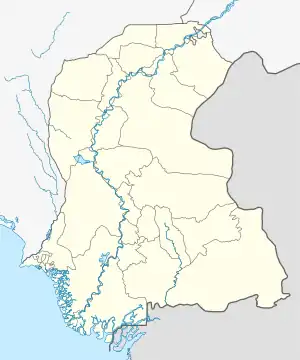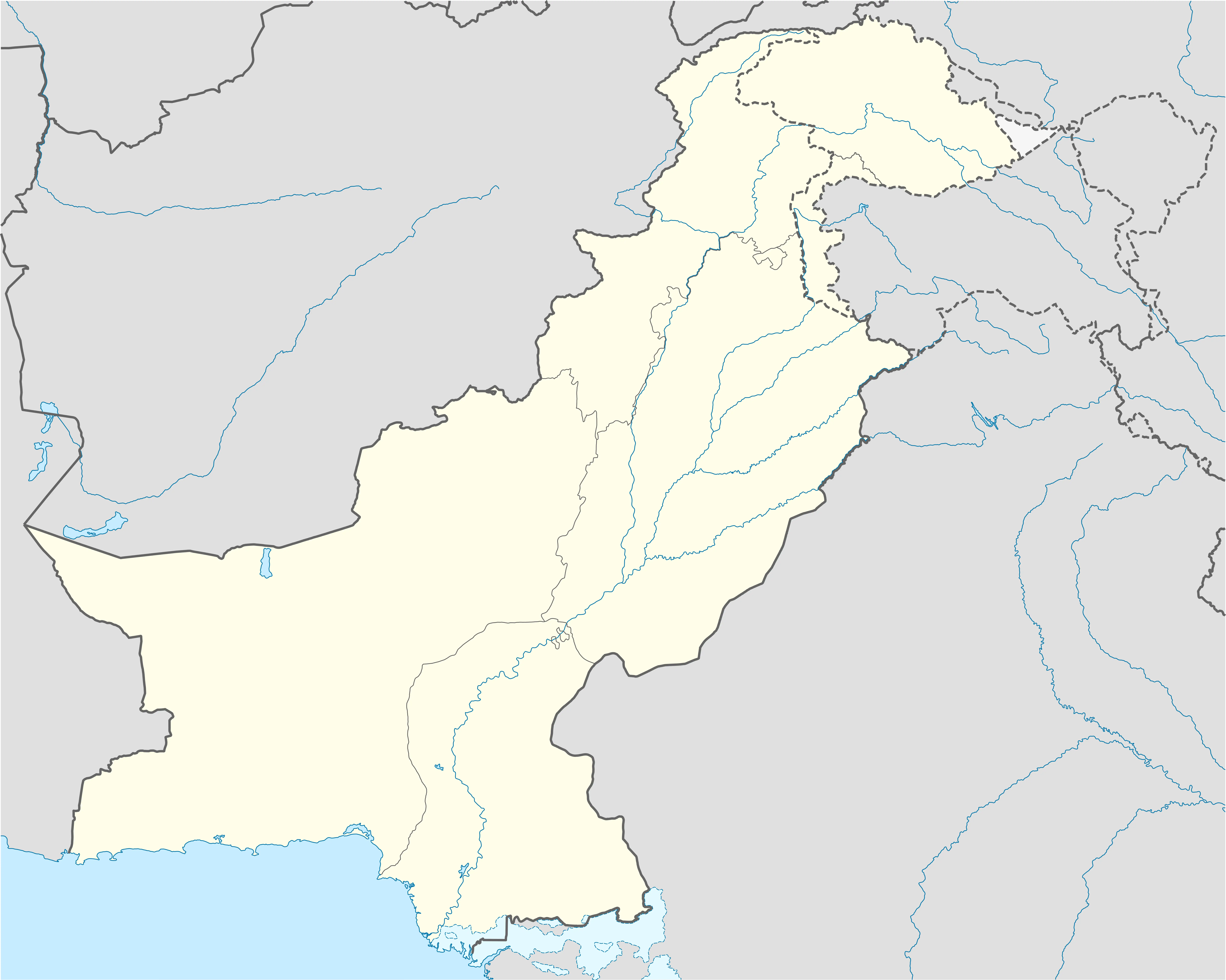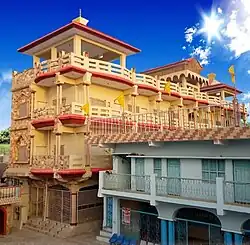Mirpur Mathelo
Mirpur Mathelo (Sindhi:میرپور ماٿيلو) is a city in Ghotki District, Sindh province, Pakistan.[2] The city is administratively subdivided into ten union councils. It is the 97th largest city in Pakistan.[3] It is also the location of the archaeological site, Moomal Ji Mari.
Mirpur Mathelo
ميرپور ماٿيلو | |
|---|---|
City | |
 Mirpur Mathelo  Mirpur Mathelo | |
| Coordinates: 28°1′N 69°32′E | |
| Country | |
| Province | |
| Division | Sukkur |
| District | Ghotki |
| Government | |
| Area | |
| • Total | 15 km2 (6 sq mi) |
| Elevation | 76 m (249 ft) |
| Population | |
| • Total | 327,821 |
| • Rank | 97th, Pakistan |
| • Density | 22,000/km2 (57,000/sq mi) |
| Time zone | UTC+5 (PST) |
| Dialling code | 0723 |
Topography
Mirpur Mathelo is a plain land with many trees, which is mostly Eucalyptus, Acacia Nilotica. Cultivation is widely found in the area. Wheat, rice and cotton are widely cultivated. Bananas, mangoes and date trees are excessively found here. Lands are irrigated both by tube wells and canals. Mirpur Mathelo is the oldest town in Sindh Province. In this town exists a very large Govt High School, Boys Degree Collage and Girls Degree Collage. In Mirpur Mathelo town, a Technical and IT Institute Siscom Technologies (https://www.siscomtek.com/) and a library is also present.
Drainage
Masu Vah (Canal) flows in the suburb of the city just near the site of Fauji Fertilizer Company Limited. It is the main source of water used for the cultivation of land. It is also a source of fish for local fishermen.
Rain
Although the amount is good it is not reliable as it happens only during the monsoon seasons and rarely occurs other than this period.
Economy
Ten Kilometers between this city and Daharki has major Pakistani industries i.e. Fauji Fertilizer Company Limited, Mari Gas Company, Liberty Power Plant and Engro Fertilizer Plant of Engro Corporation.
Demographics
According to the results of the 2017 Pakistani census, Mirpur Mathelo had a population of 327,821, of which 129,463 were males, 159,320 were females & 24 represented the Transgender population. The rural population was 77.03% & urban population was 22.96%.[4]
Language
According to the final results of the 2017 Pakistani census, 95.19% of the population spoke Sindhi, 1.30% Saraiki, 1.09% Punjabi and 1.06% Urdu as their first language. Other languages which include Kashmiri, Balochi, Hindko, Pashto and Brahui, made up 1.34% of the population.[5]
Religion
The majority religion is Islam, with 92.71% of the population. Hinduism (including scheduled castes) is practised by 7.21%, while other faiths are practised by 0.06% of the population.[6]
Religious attractions
Saint Syed Anwar Shah (Jhanpur Sharif) and Sayed Jalil Shah Bukhari on Jarwar road about 5 kilometres from Mirpur Mathelo Town and many other Saint and scholars belong from here. The historic Shadani Darbar is located here.[7]
Shops
Compared with other areas of Pakistan the city has more Hindu vendors. The city is a rising city and has many investors. Mirpur Mathelo is growing fast as compared to other cities in the Ghotki district.[8]
Fauji Fertilizer Company Limited
Fauji Fertilizer Company Limited has three plants all over Pakistan and together they are a valuable asset to the economy. Two are situated at Machi Goth, Sadiqabad lies in the next province Punjab while the other is established here. The largest fertilizer producer in Pakistan, it has also gained a prominent position in Mirpur Mathelo. Almost everyone knows about it. One reason for that is the various social welfare projects that have been completed here ranging from Sona Welfare Hospital to Sona Public School & College. FFC has also provided a lot of Job Opportunities for Mathelians and has thus improved the conditions of the area since its establishment in 2002. It is a valuable asset of Pakistan.
Unions
The unions of the city are:
Dhangro, Garhi Chaker, Jarwar, Mirpur Mathelo-I, Jahan Khan Unar, Sono Pitafi, Wahi Ghoto, Yaro Lund, Islam Khan Lashari and Dino Mako.
[9]
References
- "PAKISTAN: Provinces and Major Cities". PAKISTAN: Provinces and Major Cities. citypopulation.de. Retrieved 4 May 2020.
- Location of Mirpur Mathelo - Falling Rain Genomics
- "Sindh (Pakistan): Province, Major Cities, Municipalites [sic] & Towns - Population Statistics, Maps, Charts, Weather and Web Information". www.citypopulation.de. Retrieved 2020-02-06.
- "Population Rural-Urban, Census 2017" (PDF).
- "Population By Mother tongue, Census 2017" (PDF).
- "Population By Religion, Census 2017" (PDF).
- "Hindu pilgrims attend central ceremony of Shadani Darbar". Pakistan Today. 6 December 2018. Retrieved 23 December 2020.
- "Mirpur Mathelo".
- Tehsils & Unions in the District of Ghotki - Government of Pakistan Archived 2012-04-15 at the Wayback Machine
